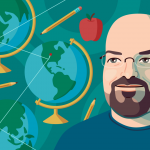How Shondaland Built A Creative Work Culture With Play-Doh, Treadmills, And Bakeoffs
“Culture is very important to me,” Shonda Rhimes says. She’s talking about Shondaland, her television production company turned media empire that these days doesn’t just produce shows like Grey’s Anatomy, Scandal, and How to Get Away with Murder, but is an online hub that reflects the empowered and inclusive message of Rhimes’s shows. One of the first pieces that appeared in the Shondaland newsletter, which debuted in the spring and has served as a lead-up to the upcoming launch of Shondaland.com, was an interview that Rhimes did with congresswoman and resistance hero Maxine Waters, whom Rhimes called “the fierce political queen on Twitter.” (The term that could also be applied to Rhimes, who has over 1.5 million followers).
Shondaland, which is profiled along with Rhimes in the September cover story of Fast Company, has been around since the dawn of Grey’s, now in its 13th season. But as the company has grown—it now has nearly 30 employees and six shows in some state of production—and moved beyond just a TV production pod based at ABC. Betsy Beers, Rhimes’s long-time producing partner, refers to it as a “state of mind.” What she means is that Shondaland is a place that “takes care of other people and makes a home for people who are curious and energetic and passionate, and who want to laugh and have a good time, but who are also just really interested in making the world better.
“It sounds like such a silly thing to say,” she goes on, “but I think we do spend a lot of time talking about sharing and not bullying and standing up for what you believe in and taking care of each other.”
Not just in terms of content. Recently, Rhimes and Beers renegotiated their deal with ABC so that Shondaland operates more autonomously. “Now, we’re our own separate entity,” says Rhimes, who notes that ABC still provides funding. “That was a big change.” Part of Rhimes’s impetus was to focus more on those around her. Coming off a publicity tour for her memoir Year of Yes, she says, “I was sick of myself in every way. I didn’t want to talk about myself. I didn’t want to be worrying about what’s best for me in the business. How can I do something better for everybody else? Like, I don’t need anything. There’s nothing that I need. I don’t need more attention. I don’t need more money. I don’t need anything. So what can I do for the people who work for us? How can we make their lives better? How do we make a better work environment? Why don’t we write a parental leave policy that’s awesome, so that if any woman or man in this company has a kid, they get to feel like, ‘Oh, wait. My company cares about me.’”
From the beginning, Rhimes and Beers have worked to make Shondaland a unique workplace. One where employees are encouraged to bring their kids to work (there’s a nursery) and that places an emphasis on creativity and diversity. “I looked around the other day and I was like, it is mostly women,” Rhimes says. “I think we have two executives who are men, and a couple of assistants who are men, but it’s pretty much all women of every ethnicity. I looked around and I was like, ‘This is amazing.’”
Shondaland is also a place that rewards loyal workers by promoting from within and does its best to respect a work-life balance. Since writing her memoir Year of Yes, about her journey saying “yes” to things like playtime with her kids, Rhimes has instituted policies like no emails after 7 p.m. or on weekends. “It’s about building a company where people feel like they are invested and have a stake in it,” Rhimes says, “versus feeling like they’re doing a job every day. I want people to be happy when they go to work.”
Rhines, Beers, and other Shondaland writers and executives, recently talked to Fast Company about how and why Shondaland doesn’t feel like your typical Hollywood TV company.
1. Jerks Need Not Apply
Nearly every startup CEO will tell you that they have a “no assholes” policy. But at Shondaland, it’s a mandate that’s strictly enforced—potential new hires are even given background checks. The rule went into effect following PR calamities that Rhimes went through in the early days on Grey’s with stars Isaiah Washington and Katherine Heigl (both left the show). But it’s in keeping with a tradition that has always been true at Shondaland: Trusted colleagues should be rewarded, not shown the door. When new positions at the company open up, usually someone from within the company is elevated. Writers jump from show to show, or go on to create their own Shondaland series. Peter Nowalk, a Scandal writer, created How to Get Away With Murder. And Paul Davies, another Scandal alumnus, is behind the upcoming legal drama For the People. The result is a tight-knit community of individuals steeped in Rhimes’s worldview and approach to storytelling.
Shonda Rhimes: “I think what happened is we worked with people that we really liked. A lot of times what happens in the television industry is people fire writers like crazy. And I felt like, if I’ve taken all this time to get these people to understand the inside of my brain, then I need to invest in them. So that’s really how it started in my mind. So writers who were on Grey’s, some of them went off to Private Practice with me, and some of them went off to Scandal.
“We wanted to keep people in the family. Do they want to do something new? Well, let’s keep taking them with us. And then, as we were starting to grow people, like, the woman (Stacy McKee) who’s writing the Grey’s spinoff was the assistant on the pilot of Grey’s Anatomy.
“The idea is that we’re growing people and keeping them involved, from line producers to directors to cameramen. That is important. First of all, they’ve learned the ways, they know our ways. Everyone has a shorthand. It’s easier in that sense. But I also feel like you reward the people who are sticking with you, and you give them opportunities. Why shouldn’t we make it a priority to bring up the younger people who have been working their butts off? Why do they get shunted to the side because somebody else has a fancier resume?”
Dan Bucatinsky (former Grey’s writer; actor on Scandal): “Shonda definitely likes the talent that she supports. She keeps it in the family. She likes the way they tell stories, writers will often be on multiple Shondaland shows. I think that’s true of the actors, as well. Paul Adelstein was on Private Practice and Scandal. Jeff Perry was on Grey’s and Scandal. Shonda’s not just loyal, but she likes to build this feeling of—in a very Desilu (Desi Arnaz and Lucille Ball’s production company), Lucy and Ricky kind of way. She’s building her own studio, which in a sense is like building a repertory company in summer theater. It all goes back to: Let me get a troupe of creative people together and become a rep company and we’ll make multiple shows and act in them and write them and perform them.”
Linda Lowy (Shondaland casting director): “We like to cross-pollinate. There’s nothing wrong with that. It’s like our traveling ensemble of people, and why not drag them with us? I like to drag people with me.”
2. Bring Your Play-Doh to Work
Rhimes describes Shondaland as a place where writers and executives, including her, plop down on sofas to brainstorm and problem-solve. There’s a fluidity to the environment. There’s also an emphasis on creativity, not just in plot points or the kinds of shows that are written, but in the writing and thinking process itself. Nowhere is this more true that in the Grey’s writer’s room, which Rhimes says “feels like kindergarten.”
DB: “Until Grey’s, I’d never been in a writers room where people were so actively being creative in other ways while we were breaking story. People were doing paint-by-numbers and putting together Play-Doh sculptures and doing 1,000-piece puzzles while we were trying to break a story.”
SR: “It’s a room full of people who need something to do with their hands. It started as a group of people who . . . we put a treadmill in there, and everybody made sure they had a run on it, like, while they pitched. It’s that kind of room. It’s a highly competitive room, and the art projects were highly competitive art projects. When I was there, we used to have a bake-off every year, where we competed about our baked goods. It was intense.”
Peter Nowalk: “At Grey’s, I became obsessed with paint-by-numbers, like, the kids’ ones. Stacy McKee, the show runner, was very craft-oriented. There’s something about preoccupying your mind with something simple while you’re being creative. So rather than all of us just staring at each other across a boardroom table being like, What do you think should happen? For me, it would free up the creative side of my brain when it was busy doing something else. It’s why people go for walks or take a shower.
“In the Murder room, we have no tables. We sit around couches. There are snacks and a bar cart on Friday. Some people doodle and draw. It’s a lot of time in the room with people staring at a board. You need things to energize you.”
3. Understand Your Leader’s Brain
A strong work culture is also a unified work culture. At Shondaland, this means that everyone, as Rhimes says, “understands the inside of my brain.” Or in the case of Beers, share the same brain. This common sensibility is ingrained in people, especially writers on Rhimes’s shows, whose job it is to effectively channel Rhimes’s approach to character and storytelling. But even beyond the shows, this shared mission keeps everyone on the same page as the company expands into new areas.
Paul Davies: “I think of it as Shondaland University. There’s a contingent of folks who have attended, because they came here as assistants and they’ve come through it. It’s just being here and spending time around Shonda and listening to her and seeing what she responds to, watching her writing—she rewrites a lot of stuff. It’s just that education by experience.”
SR: “Grey’s, for a long time, was a show that I was still rewriting and going to the writers room on. But we just brought back my old head writer, Krista Vernoff, from seven years ago. She’s going to run things. It’s the first time I’ve really ceded control. And I’m a control freak. But it’s just, I trust her as a writer, in the sense that she and I will think about the same things. I’ll go, ‘What’s going on?’ And she’ll say something, and I’ll be like, ‘I was thinking about that a month ago.’ So it feels really good. I’ll still be there as a person who’s at every table read and talking to the actors, but I’ve ceded the writers room to somebody else, and that’s exciting.”
Betsy Beers: “We share the same brain is the best way, I think, to say it. We tend to be able to, at this point, sort of intuitively fill the gaps that are left. I still believe that my job is to create an environment for Shonda where she can do the best work she possibly can. I feel that way about creators of all our shows. That’s what a producer does. My job is to create the space and give the input to do whatever the hell it is she needs to make the work as good as it can be.”
4. Put Your iPhone Down
In Year of Yes, Rhimes, a self-described workaholic, writes about learning to embrace downtime and playtime with her children, who typically demand it when she’s walking out the door to work. She finds that usually her kids just need 15 minutes—that’s it—and that if she actually sits down and focuses on them, everyone walks away feeling happier. Even more, Rhimes walks away feeling more creative and productive when she turns to work. The realization led her to change the bottom of her email signature so that it reads: “Please note: I will not engage in work emails after 7 pm or on weekends. IF I AM YOUR BOSS, MAY I SUGGEST: PUT DOWN YOUR PHONE.”
Rhimes writes, “I know now that this downtime is helping to relight that little spark inside, it’s helping my creativity and in the long run helping me tell the stories my work needs me to tell. I give myself permission to view this downtime as essential. It’s hard to do. It’s hard to feel like I deserve any time to replenish the well when I know everyone else is working hard, too.”
LL: “When I first got the thing about ‘no emails after 7’ and ‘if you work for me, you should put down your pencil,’ I was like, Oh, right. I don’t think you want me to do that. Because then we won’t have any actors for tomorrow. But I liked the idea of it. Listen, Shonda’s plate is super full and she’s got three children. My kids are grown. I can work a little later than 7. That’s fine. But my staff always brings that up to me. They’ll be like, ‘Remember what Shonda said about after 7? We gotta go home.’”
What it’s like to work at Shonda Rhimes’s production company slash media brand.
Fast Company , Read Full Story
(40)













